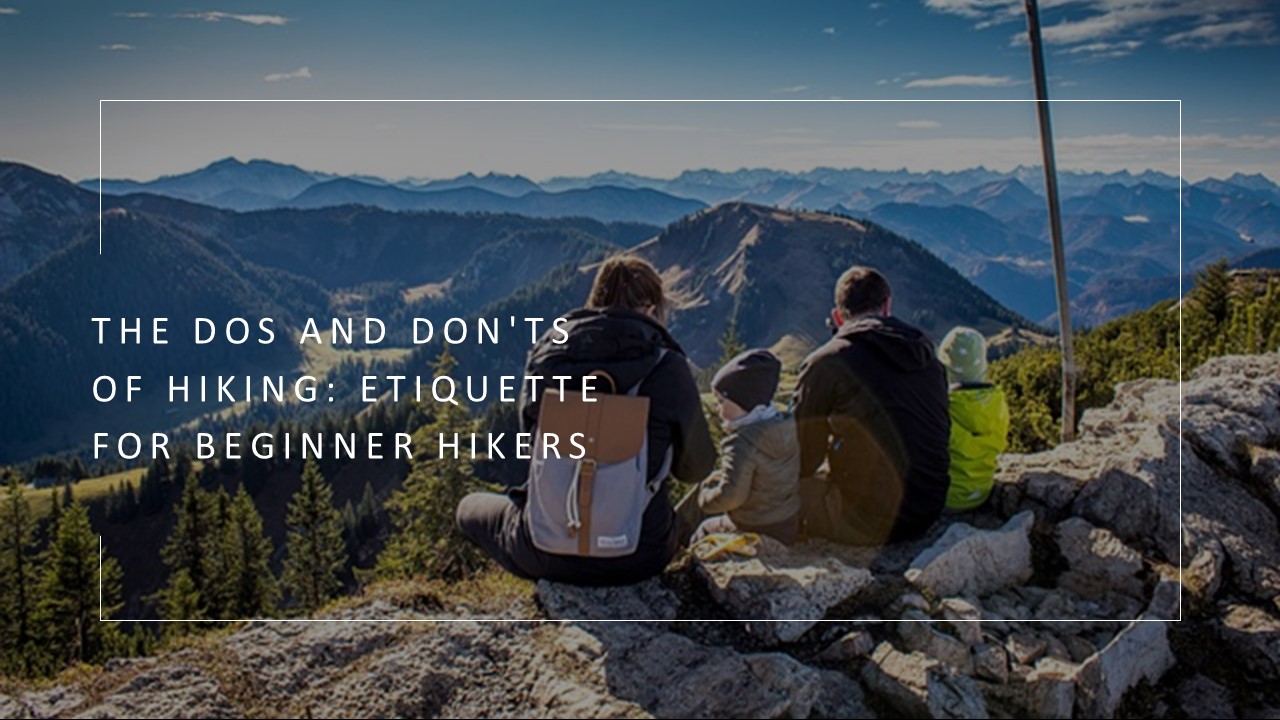Hiking is an amazing way to connect with nature, explore new places, and stay active. However, as a beginner hiker, it’s important to learn proper hiking etiquette to ensure a safe and enjoyable experience for yourself and others on the trail. Hiking etiquette involves following certain guidelines and rules to respect nature, wildlife, and other hikers. In this guide, I will go over the dos and don’ts of hiking etiquette for beginner hikers.
Following these guidelines will help you become a responsible and respectful hiker while preserving the natural beauty of the outdoors for future generations to enjoy. Let’s get started!
Dos of Hiking Etiquette
- Respect nature and wildlife: One of the most important dos of hiking etiquette is to respect nature and wildlife. This means not disturbing plants, animals, or natural habitats, and keeping a safe distance from wildlife. Avoid feeding wildlife and do not approach them for photos.
- Stay on designated trails: Always stay on designated trails to avoid damaging fragile ecosystems and to respect private property. Going off-trail can also put you at risk of getting lost or encountering dangerous terrain.
- Leave no trace: Leave no trace means leaving the trail and campsite in the same or better condition than you found it. This involves properly disposing of all waste, packing out all trash, and not damaging or removing any natural objects or artifacts.
- Yield to other hikers on the trail: If you encounter other hikers on the trail, yield to them by stepping aside or moving to the side of the trail to let them pass. Uphill hikers generally have the right of way.
- Be prepared for the hike: Always come prepared with appropriate gear, clothing, and supplies for the hike. This includes proper footwear, water, food, a first-aid kit, and a map or navigation tool.
- Follow posted rules and regulations: Many hiking trails have posted rules and regulations that must be followed, such as trail closures or restrictions on camping or fires. Be sure to read and follow all posted signs.
- Be friendly and courteous to other hikers: Being friendly and courteous to other hikers can make the hiking experience more enjoyable for everyone. Greet other hikers with a smile or hello and be respectful of their space and privacy.
Don’ts of Hiking Etiquette
- Do not disturb the natural environment: It’s important to leave the natural environment as you found it. Avoid removing or damaging plants, rocks, and other natural objects. Do not build cairns or other structures, as they can be misleading to other hikers.
- Do not litter: Always pack out all trash and waste, including food scraps, wrappers, and toilet paper. Do not bury or burn trash, as it can harm the environment and wildlife.
- Do not trespass on private property: Stay on designated trails and respect private property boundaries. Do not enter private land or buildings without permission.
- Do not make excessive noise: Be mindful of noise levels, especially in areas where wildlife may be present. Keep music and conversations at a reasonable volume to avoid disturbing other hikers and wildlife.
- Do not bring pets unless allowed on the trail: Before bringing your pet on a hiking trail, make sure they are allowed and follow all rules and regulations for pets. Keep your pet on a leash and clean up after them.
- Do not start a fire unless it is permitted: Fires can cause damage to the environment and wildlife and may be prohibited in certain areas. Always check for fire restrictions before starting a fire, and use established fire rings or fire pits if provided.
- Do not pick or damage plants or wildlife: Do not pick flowers or disturb wildlife. They play an important role in the ecosystem and their removal can have negative effects on the environment.
7 Hiking Etiquette in Detail
1. Respecting nature and wildlife
Respecting nature and wildlife is a critical part of hiking etiquette. When hiking, be aware of the natural environment around you and take care not to damage or disturb it. Avoid stepping on plants or disturbing rocks and soil, as this can have long-lasting effects on the ecosystem. When encountering wildlife, keep a safe distance and do not approach them. Feeding or touching wildlife is prohibited, as it can harm their natural behavior and health.
2. Staying on designated trails
Staying on designated trails is essential to protect fragile ecosystems and respect private property. Trails are often designed to avoid sensitive areas, and straying from them can damage natural habitats, cause erosion, and create new trails that can confuse hikers. Always stay on the marked trail, and if you encounter an obstacle or need to rest, move off to the side to avoid blocking the trail.
3. Leaving no trace
The leave-no-trace principle is a set of guidelines for minimizing your impact on the environment. When hiking, always carry out everything you bring in, including trash, food scraps, and toilet paper. If you need to go to the bathroom, use established restroom facilities or dig a small hole at least 200 feet from water sources, trails, and campsites. Do not disturb natural objects or artifacts, and avoid building structures or altering the environment in any way.
4. Yielding to other hikers on the trail
Yielding to other hikers on the trail is important for maintaining a safe and enjoyable hiking experience. Uphill hikers generally have the right of way, as it can be more difficult for them to stop and start again on a steep incline. If you need to pass another hiker, do so on the left side, and be sure to alert them with a friendly greeting or bell ring.
5. Being prepared for the hike
Being prepared for the hike is crucial for your safety and comfort on the trail. Before setting out, research the trail, weather conditions, and difficulty level to ensure you are physically and mentally prepared. Bring appropriate gear, such as sturdy hiking shoes, sun protection, and extra layers for changing weather conditions. Pack plenty of water and high-energy snacks, and carry a map or navigation tool in case you get lost.
6. Following posted rules and regulations
Hiking trails often have posted rules and regulations, such as restrictions on camping, fires, or wildlife interactions. Always read and follow these rules, as they are designed to protect the environment and ensure the safety of hikers. If you are unsure of a rule, ask a park ranger or other hiker for clarification.
7. Being friendly and courteous to other hikers
Being friendly and courteous to other hikers can make the hiking experience more enjoyable for everyone. Greet other hikers with a smile or hello, and be respectful of their space and privacy. Avoid loud or disruptive behavior, and do not play music or use electronic devices without headphones. If you encounter a group of hikers, wait patiently for them to pass, and be sure to thank anyone who yields to you on the trail.
Conclusion
Following proper hiking etiquette is essential for a safe, enjoyable, and sustainable hiking experience for both yourself and others. The dos and don’ts of hiking etiquette can be summarized as respecting nature, staying on designated trails, leaving no trace, yielding to other hikers, being prepared for the hike, following posted rules and regulations, and being friendly and courteous to other hikers. By following these guidelines, you can help preserve the natural environment for future generations and ensure that everyone can enjoy the beauty of the outdoors. Remember, hiking is a privilege, and it is up to all of us to protect and respect the environment and each other while enjoying the great outdoors.
You might like to read the ultimate hiking gear checklist.










